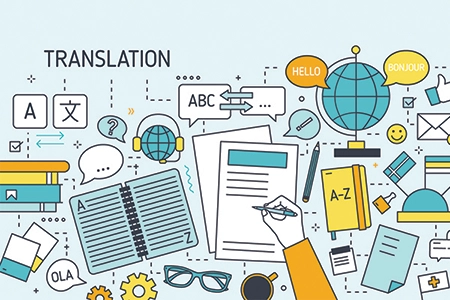Understanding the translation certification processes is crucial for both translators and clients. It ensures the quality and accuracy of translated documents. The certification process can vary significantly across states and countries, reflecting diverse standards and requirements. Whether you are a translator seeking to enhance your credentials or a client needing reliable translation services, knowing the specifics of these processes can help you make informed decisions. This blog post will explore the translation certification processes in various regions, including the United States, the United Kingdom, Canada, Australia, the European Union, and Turkey. By highlighting each system’s common elements and unique aspects, we aim to provide a comprehensive guide to navigating the complex world of translation certification.
Translation Certification Processes in the United Kingdom
The United Kingdom boasts a robust system for translation certification, primarily overseen by two prominent organisations: the Chartered Institute of Linguists (CIOL) and the Institute of Translation and Interpreting (ITI). These organisations are the backbone of the system, setting high standards for translators and ensuring the quality and reliability of certified translations.

Do you need a Certified Turkish-to-English Translator in London?
Are you in search of a proficient Turkish English translator? Click the “Get a Translation Quote” button below and see how our adept English-Turkish translation team can aid in overcoming linguistic hurdles. Our services cater to various needs, including business, legal, or personal document translation, guaranteeing meticulous accuracy in every project.
CIOL Certification
The Chartered Institute of Linguists (CIOL) offers the prestigious Diploma in Translation (DipTrans), widely recognised as a mark of professional excellence in translation.
- Eligibility: To be eligible for the prestigious Diploma in Translation (DipTrans) offered by the Chartered Institute of Linguists (CIOL), candidates typically require a degree in languages or translation. However, equivalent professional experience may also be accepted, opening the doors to a wider range of qualified individuals.
- Exam Format: The DipTrans exam comprises three units: a general translation and two specialised translations in law, technology, or literature. The exam evaluates candidates’ ability to produce accurate and fluent translations under timed conditions.
- Renewal: CIOL members must engage in continuous professional development (CPD) to maintain their status and remain updated with industry practices and standards.
ITI Certification
The Institute of Translation and Interpreting (ITI) offers a highly respected accreditation for translators in the UK. ITI membership is a symbol of quality and professionalism.
- Eligibility: Candidates must demonstrate a high level of proficiency in their language pairs and typically need a degree in translation or significant professional experience.
- Assessment Process: ITI evaluates candidates through a demanding process, which includes submitting a detailed portfolio demonstrating their translation work. Successful candidates are granted accreditation as members of ITI.
- Continuing Professional Development: ITI members must participate in CPD activities to maintain their membership and keep their skills and knowledge current.
Certification of Translations
In the UK, translation certification involves a formal declaration of accuracy, often known as a “Statement of Truth.” This process is essential for legal, official, and other sensitive documents.
- Statement of Truth: The translator provides a signed declaration stating that the translation is accurate and complete to the best of their knowledge. This statement typically includes the translator’s qualifications and contact information.
- Notarization: For legal and official documents, the Statement of Truth is often signed by a solicitor or notary public, who then notarises the document to add a layer of authenticity and credibility.
- Professional Seals: Translators who are members of CIOL or ITI often use their professional seals on the certification, enhancing the document’s credibility and acceptance.
Understanding the translation certification processes in the United Kingdom, including the roles of CIOL and ITI, is crucial for ensuring the integrity and quality of translations. These certifications not only enhance the professional reputation of translators but also instil confidence in clients regarding the accuracy and reliability of their translated documents.
Translation Certification Processes in Turkey
In Turkey, translation certification is a formal and regulated process, ensuring that translators meet high standards of proficiency and reliability. Sworn translators play a crucial role in certifying translations for legal, official, and other sensitive documents.

Expert English-Turkish Translation Services at Your Fingertips
Click the “Get a Translation Quote” button now. Let our certified English-Turkish translators handle your translation needs with expertise and cultural insight. We offer other languages as well. Just visit EnglishTranslation.net.
Sworn Translators (Yeminli Tercüman)
Sworn translators, known as yeminli tercüman, are authorised to certify translations in Turkey. Becoming a sworn translator involves proving one’s language proficiency and credibility.
- Eligibility: Translators must establish beyond doubt their fluency and good command of the foreign language in which they wish to certify translations. This is most commonly demonstrated through a degree in linguistics or translation. Documented professional experience in a foreign country may be accepted in some cases.
- Appointment Process: To become a sworn translator, individuals must apply to a notary public and present their credentials, such as their degree or proof of professional experience, to the notary.
- Sworn Oath: Once the notary verifies the translator’s qualifications, the translator takes an oath before the notary public. This oath signifies the translator’s commitment to accuracy and integrity in their translations.
Certification of Translations
In Turkey, translations are certified after a formal declaration by the sworn translator, ensuring their accuracy and authenticity for legal and official use.
- Declaration of Accuracy: The sworn translator provides a signed and stamped statement affirming that the translation is accurate and complete to the best of their knowledge. This declaration includes the translator’s name, contact information, and credentials.
- Notarization: The certification process typically involves notarisation, where the translator signs the declaration in the notary public’s presence. The notary then notarises the document, adding an official seal to ensure its acceptance by authorities.
- Official Seals: Sworn translators use their official seals on certified translations, which enhances the document’s credibility and authenticity. Government bodies, courts, and other institutions recognise this seal.
Translation Certification Processes: Professional Associations
Membership in professional associations, such as the Association of Translation Companies (Çeviri İşletmeleri Derneği), further enhances a translator’s credibility. These associations often provide additional resources and support for translators and promote high standards within the industry.
- Çeviri İşletmeleri Derneği: This association represents translation companies and professionals in Turkey, advocating for quality and professionalism in the translation industry. Membership can provide translators with additional credibility and networking opportunities.
Understanding the translation certification processes in Turkey, including the role of sworn translators and the importance of notarisation, is crucial for ensuring the accuracy and reliability of translated documents. These processes uphold high standards and provide clients with confidence in the quality and authenticity of their translations, particularly for legal and official purposes.



